The new Lexus IS250C made its world debut at the 2008 Paris motor show, ahead of going on sale across Europe during the summer of 2009. The new model combines the award-winning design of the IS sports saloon with outstanding open-top engineering ingenuity.
The IS250C displays Lexus quality and attention to detail in every aspect of its construction and is designed to exceed customer expectations with its fusion of top-down driving pleasure and uncompromised dynamic performance.
It also boasts the fastest opening time for a three-part roof design, with its lightweight aluminium structure folding away in just 20 seconds.
The Lexus IS250C shares its smooth 205bhp (208 DIN hp) 2.5-litre petrol V6 engine and six-speed automatic transmission with the Lexus IS250 saloon. It has been styled to offer minimal wind turbulence when driving with the top down and extensive revisions to the body structure and suspension provide the right degree of torsional stiffness to ensure a level of ride comfort appropriate for a Lexus. In coupe trim, the car's low NVH performance is on a par with that of the IS saloon.
Thanks to the remarkably compact packaging of the three-part roof mechanism, there is a large boot space, together with easy rear seat access and generous accommodation for rear passengers.
The new coupe/convertible is the third model in the IS range, joining the IS petrol and diesel-powered sports saloon and the ultra-high performance 5.0-litre V8-powered Lexus IS-F, which introduced the F Sports designation to the line-up earlier this year.
EXTERIOR DESIGN
The Lexus IS250C builds on the elegant proportions, sweeping, sculptural lines and contrasting convex and concave surfacing of the IS saloon range to combine the muscular appeal of a sports coupe with the stylish lines of a convertible.
Only the bonnet, headlamps, door handles and mirrors are shared with the IS saloon, all other body panels have been redesigned to ensure they harmonise perfectly with the three-part folding roof.
A new fog lamp design is neatly integrated into the deep front air dam and, in side profile, the coupe/convertible's powerful stance is characterised by muscular coachwork below a pronounced, rising belt line that kicks up towards the rear of the car.
The steeply raked windscreen flows seamlessly into the aerodynamic arc of the roof line. This meets the surface of the boot with a crisp C-pillar that is incorporated in the roof structure. In coupe form the cabin tapers to the rear to give a flowing line from the roof through the C pillar to the luggage compartment. At the rear there are new lamp clusters with LED illumination and a high-mounted LED stop light integrated in the boot lip spoiler.
With the hard top down, the Lexus IS250C has a seamless and elegant profile that is punctuated only by an integral roll-over hoop behind the rear seat headrests. No roof mechanism elements remain in view or project above the car's waistline, with the complete structure concealed beneath the boot surface and flush-fitting rear parcel shelf.
The roof is made entirely of lightweight aluminium and gives an unparalleled smooth, seamless and silent operation. It is raised and lowered by means of a dashboard button and features a unique "roof brake" mechanism, which slows the closing of the hard top as it approaches the top edge of the windscreen. Unlike other systems in which the weight of the roof causes the closing speed to increase just before the point of closure, it descends smoothly into place.
INTERIOR DESIGN AND COMFORT
The Lexus IS250C offers the same high levels of luxury and practical innovation as the IS saloon, with a number of bespoke technical revisions designed to ensure the on-board comfort and entertainment systems operate effectively when the roof is down.
The instrument panel, surrounding elements and the steering wheel are the same as on the IS saloon, but the instrument binnacle in front of the driver has been extensively revised to ensure good visibility is maintained during top-down driving.
The climate control system has been configured for top-down motoring, with the addition of speed sensitive control, which automatically increases air flow when the roof is lowered and further increases it in line with vehicle speed.
The 12-speaker Mark Levinson Premium Surround Sound system features equaliser tuning to ensure consistent audio quality whether the roof is up or down, automatically adapting to the natural loss of bass when the roof is stowed. The two full-size rear seats are set 30mm further inboard to optimise headroom and are divided by a centre console with built-in cupholders. Slimmer profiles for the front seats help ensure good legroom for rear passengers.
Accessing the rear seats is made easier by wide-aperture doors that are 300mm longer than those on the IS saloon and a one-touch walk-in button control that quickly and neatly folds and slides the front seats forwards.
The rear overhang is greater by 50mm compared to the saloon. This, together with the exceptionally compact packaging of the folding roof, gives significantly more luggage space, with room for a nine-inch golf bag to be carried with the hard top stowed and the luggage cover in place.
AERODYNAMICS AND WIND STREAM MANAGEMENT
The Lexus IS250C has been designed to combine the lowest possible drag coefficient with minimal wind turbulence affecting the cabin when the roof is down. Key features include a steeply raked windscreen, ultra-smooth cabin profile, aerodynamically efficient "duck tail" rear styling that gives an "airkick" effect, detail rear lamp cluster design and a an array of underbody covers. With the hard top in place the drag coefficient is 0.29, which compares very favourably with the 0.27 Cd of the saloon.
Lexus design engineers focused on reducing wind turbulence and generating the most comfortable airflow pattern for passengers when the roof is lowered. The angle of the windscreen and its top edge are major factors in achieving this performance.
RIDE COMFORT
The Lexus IS250C uses the proven front double wishbone and multink rear suspension format from the IS saloon range to give sporting, agile performance. Significant chassis revisions promote greater ride comfort suitable for a convertible and ensure consistent dynamic performance in both coupe and convertible guise.
Extensive temperature, vibration and shaking tests were carried out to ensure the changes to the bodyshell and chassis maintain NVH characteristics almost identical to those of the IS saloon. Class-leading low wind noise levels are achieved with help from acoustic glass for the windscreen and painstaking design of the roof, door and window panel seals.
SAFETY
The Lexus IS250C has been designed to achieve a five-star frontal impact rating in Euro NCAP crash testing, with world-class safety performance in both coupe and convertible configuration. Numerous changes in the body structure enhance collision strength, roll-over protection and torsional rigidity, minimising cowl shake and optimising chassis control.
Like the IS saloon, it benefits from the highest content of sophisticated active and passive safety technology in its segment, including Lexus's Vehicle Dynamics Integrated Control (VDIM), incorporating Vehicle Stability Control (VSC) that is tuned specifically for open-body driving and which gives shorter stopping distances on road surfaces with uneven levels of grip. A revised Pre-Crash Safety (PCS) system is also available, supporting pre-crash seatbelt and braking functions, and the passenger front airbag has a twin-chamber design for safer and more effective operation.
For added protection when driving with the roof down, the Lexus IS250C is equipped with new-design larger side airbags that provide head protection in the event of a side impact. The bodyshell also features additional energy-absorbing side impact pads for both front and rear seat occupants.

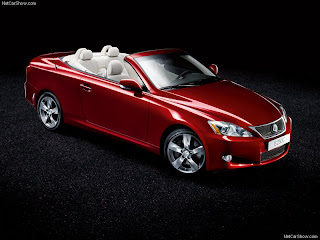
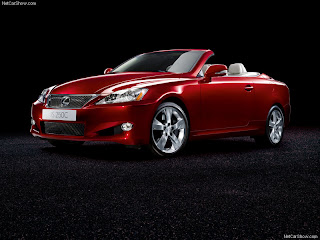
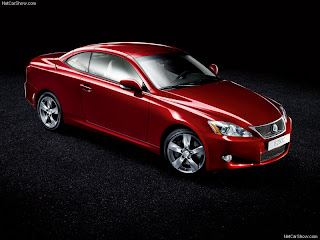
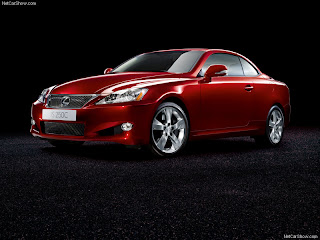
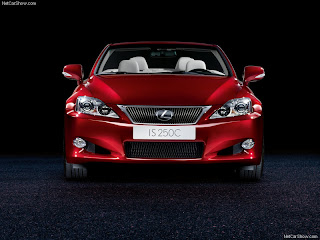
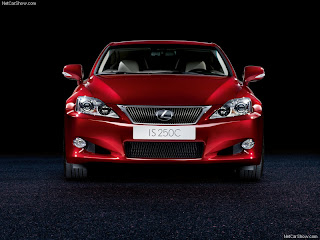



No comments:
Post a Comment